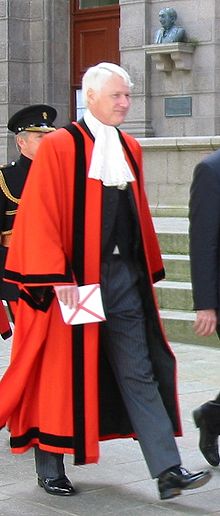Bailiff of Jersey
[4] Any oppression by a bailiff or a warden was to be resolved locally or failing that, by appeal to the King who appointed commissioners to report on disputes.While probably originally a temporary arrangement by Otto de Grandson, this became permanent and the foundation for Jersey's modern separation of Crown and justice.[5] In 1462, the occupying French Governor de Brézé issued ordinances outlining the role of the Bailiff and the Jurats.Absences of the de Carterets and all other high-ranking posts left Charles Lempière, the Lieutenant Bailiff, in effective full control over the island.His family had significant power with a number of high-ranking roles in the island and he issued ordinances and quashed protest through his court.The introduction of deputies into the States in 1857 added to the democratic weight of the legislative assembly, but the bailiff still guided the government of the bailiwick.[10] Although the need for centralised administration during the German Occupation 1940-1945 made the Bailiff a commanding figure in the circumstances of trying to maintain the life of the bailiwick, the constitutional reforms of 1948 which removed the Jurats from the States, replacing them with Senators, separated more clearly legislature and judiciary.[13] The 2005 law also introduced a ministerial system of government under a Chief Minister, which further removed the Bailiff from involvement in executive decision-making.Le Hérissier notes that ‘From 1771 to 1940, the States slowly detached themselves from the influence of the Royal Court’, growing more representative with the inclusion of elected members – but the Bailiff remained.The 1947 Report of the Committee of the Privy Council on the Proposed Reforms in the Channel Islands recommended 'that there should be no alteration in the present functions of the Bailiff'.[38] There have also been concerns that the Bailiff's position as President of the States Assembly conflicts with the constitutional principles of separation of powers and judicial independence.He receives Royalty, visiting ambassadors and other prominent visitors to Jersey, plays the leading part in the Liberation Day and Remembrance Sunday ceremonies and hosts a number of official dinners.[3] The Bailiff presides over the Licensing Assembly, the remains of a body which once exercised considerable administrative authority, but now only has the powers to grant alcohol licences.[46] Since 1987, an advisory panel appointed by the States Assembly has delegated authority in the name of the bailiff who is not involved in any respect with the decision-making process.[48] The Monty Python film 'Life of Brian' was deemed suitable only for islanders over 18, which led to the production company refusing to let it be shown in Jersey.


Law of JerseyCourts of JerseyBailiff (Channel Islands)Norman lawAdvocateJudiciary of Jersey (list)Sir Timothy Le CocqMonarch of the United KingdomTerm lengthAt His Majesty's PleasureFrenchStates AssemblySir Michael BirtBailiffTreaty of Paris 1259Henry IIIDuchy of NormandyJerseyGuernseyKing JohnOtto de Grandsonde BrézéSir John PeytonJean Héraultletters patentCorn RiotsJersey lawsCharlotsde Carteret familyCharles LempièreGerman Occupation 1940-1945casting voteChief MinisterJersey lawyerJuratsSecretary of State for JusticeHome Secretaryround robinVernon Tomesjudiciary of JerseyRoyal Courtchief justiceCourt of AppealCourt of Appeal of Guernseyjudge of factspeakerClothierCarswellLiberation DayRemembrance SundayLieutenant GovernorEdward IPeter CrillHoward Brenton'sChristie in LoveCoriolanusGeorge PaulettPhilippe de CarteretSir George de CarteretSir Philippe de CarteretSir Charles de CarteretJohn Carteret, 2nd Earl GranvilleRobert Carteret, 3rd Earl GranvilleHenry Frederick, Lord CarteretSir Robert Pipon MarettLord CoutancheSir Alexander CoutancheCecil Stanley HarrisonSir Robert Le MasurierSir Frank EreautSir Peter CrillSir Philip BailhacheSir William BailhacheRobert MacRaeLieutenant Governor of JerseyList of bailiffs of GuernseySeigneur of SarkHistoryArchaeologyGerman occupation during World War IIEvacuationResistanceCivilian lifeDeportationsSechsschartentürmeGerman tunnelsWar Tunnels MuseumBattery LothringenBattery MoltkeChannel Islands Occupation Society (CIOS)COVID-19WindmillsCoastal fortificationsMaritimePerquagesLa Cotte de St BreladeDolmensLa Hougue BieMont OrgueilGrosnez CastleElizabeth CastleBattle of JerseyLa Corbière LighthouseJersey RailwayJersey Eastern RailwayJersey HeritageNational TrustEducationSchoolsGrainvilleHaute ValleéHautlieuJersey College for GirlsLe RocquierLes QuennevaisVictoria CollegeHighlands College, JerseyBeaulieu Convent SchoolDe La Salle CollegeSt Michael's PreparatoryGeographyGeologyParishesReservoirsSt HelierSaint Aubin